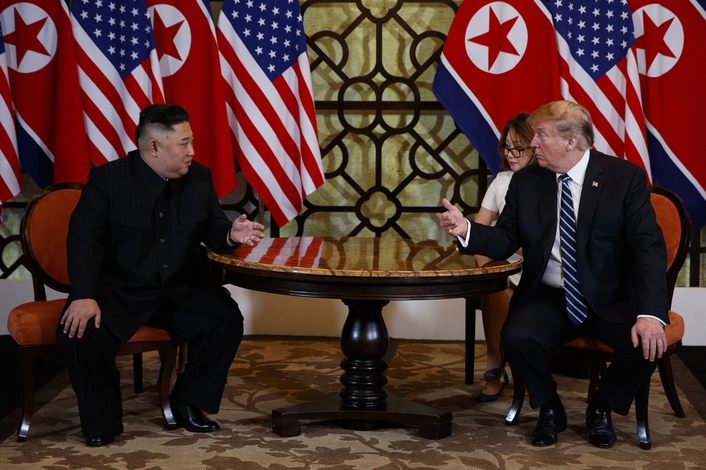Posted on : Mar.2,2019 15:20 KST
Modified on : Mar.2,2019 15:48 KST
 |
|
North Korean leader Kim Jong-un and US President Donald Trump during their Hanoi summit on Feb. 28. (AP/Yonhap News)
|
The second North Korea-US summit may have failed to produce an agreement despite the massive expectations going into it, but both sides have confirmed their commitment to resuming dialogue. US President Donald Trump said that he would continue to maintain his “good relationship” with North Korean leader Kim Jong-un despite the talks’ collapse on Feb. 28; North Korea’s Rodong Sinmun newspaper responded on Mar. 1 by writing that the two leaders had agreed to “continue productive dialogues.” Neither side has yet set a follow-up schedule, but it is laudable that they have both refrained from mutual denunciations and stated their intent not to let go of dialogue going ahead.
It is often considered a given that summits don’t fail, so the agreement’s failure does come as a shock. The mood at the moment is not one where either side will move quickly to shake off the confusion and resume the dialogue. That is evidence from remarks by North Korean Vice Foreign Minister Choe Son-hui, who said she had “gotten the impression that [Kim] may have lost some of his excitement about making a deal with the Americans in the future,” or US Secretary of State Mike Pompeo’s prediction that resuming dialogue would “take a little while.” But it’s also true that the chill threatens to drain the momentum from dialogue the longer it persists. It’s a moment that calls for urgent efforts to grab the reins and get the dialogue back on track from its brief diversion.
The summit cannot be seen as a total failure either. Indeed, it could be a benefit that both sides have confirmed their differences surrounding sanctions relief and denuclearization. They also bridged much of their differences on the establishment of mutual liaison offices. In October 1986, then-US President Ronald Reagan and Soviet Union Communist Party General Secretary Mikhail Gorbachev failed to reach an agreement in a meeting at Reykjavik, Iceland, but they did continue their dialogue, which led to their agreement in Washington on the Intermediate-Range Nuclear Forces Treaty (INF) in December the following year.
It goes without saying that South Korean President Moon Jae-in’s role as a catalyst is more urgently needed than ever. Trump himself called Moon after the agreement fell through to ask for his active mediation. He needs to play the role of creative mediator, communicating proactively with both Kim and Trump to guide them toward a balanced compromise. With North Korea-US dialogue likely to face a dry spell for the time being, the South Korean government needs to consider ways of using progress in inter-Korean relations as a driving force toward a resolution on the North Korean nuclear issue. Kim had originally been expected to pay a reciprocal visit to Seoul as early as late March or early April. As a way of securing momentum for dialogue, we hope Seoul actively considers pushing ahead with his visit in spite of the North Korea-US summit’s failure to produce an agreement.
Please direct comments or questions to [english@hani.co.kr]






